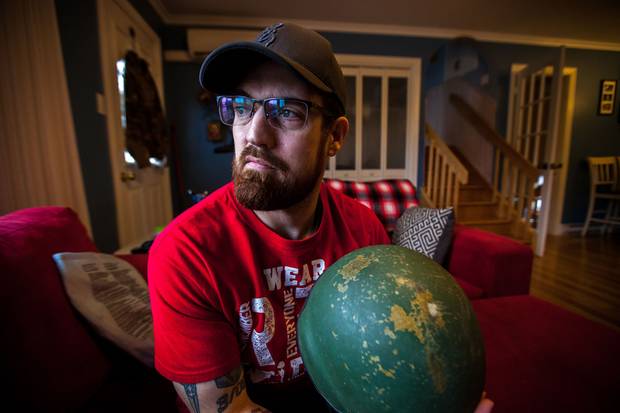Mike McNeil does not remember leaving the paved road in his one-man mine-detection vehicle in Afghanistan in November, 2009.
Mr. McNeil, who was then a corporal in the Canadian military, does not remember the explosion of the 140-kilogram improvised bomb that lifted the multitonne trailer he was towing onto his truck and hurled a door panel into his head so hard it dented his Kevlar helmet.
He does remember waking up vomiting amid the wreckage and stuttering for the first time in his life.
The stutter has never subsided. His body still shakes. He still walks with a cane and he is in constant pain.
Because he returned to duty as ordered just days after the incident, high on painkillers and unable to pass mental fitness tests, Veterans Affairs Canada has denied his application for the $70,000 tax-free critical injury benefit that was created for soldiers who suffer the most severe and traumatic service-related injuries.
Retired corporal Mike McNeil is embroiled in a dispute for compensation with Veterans Affairs.
A panel that heard an appeal of that denial said the explosion of Nov. 14, 2009 was "traumatic and led to a disabling condition [for Mr. McNeil]. The event caused the symptoms, but not the immediate, severe impairment that is required" to qualify for the benefit, said the panel judges who upheld the decision to deny him the benefit.
They pointed out that Mr. McNeil was treated in the military hospital at the Kandahar Air Field for less than 24 hours, then went back to work and served out the remainder of his 216-day tour.
Mr. McNeil, on the other hand, argues that his symptoms were both immediate and severe. He just found a way to power through his pain and his disability.
"I was a good soldier," he said in a recent interview from his home in Fredericton. "I would have done whatever they had asked, even in pain. When they said 'you're going back out,' I said 'yes sir.' "
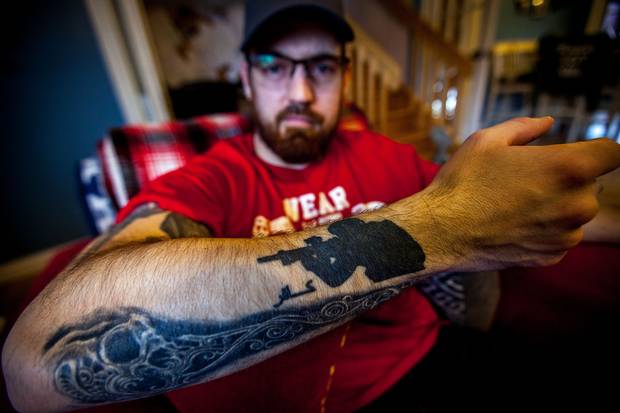
One of Mr. McNeil’s tattoos reads ‘infidel’ in Arabic. ‘Kids used to throw rocks at us and scream “infidel” so a bunch of us got it tattooed,’ he said.
The married, 35-year-old father of three children has not been able to work since he was medically discharged from the military in 2014 as a result of the wounds he sustained in the bomb blast. He qualified for many Veterans Affairs benefits, including a lump-sum disability award of just under $333,000 and a pension that amounts to 90 per cent of his prerelease salary.
But he points out that he is not entitled to other benefits that he would have received had he been able to remain a soldier for a full 10 years. And he is angry with the way he has been treated by a government that he says is denying his obvious impairment.
"I want them to start admitting the truth," Mr. McNeil said.
The Veterans Affairs department says, as of March 31, 2017, 150 soldiers and former soldiers have received the critical injury benefit that was introduced in 2015 but can be claimed by any member of the military who was injured after April 1, 2006.
The department, which cannot discuss Mr. McNeil's case for privacy reasons, said in an e-mail that some former soldiers who suffer traumatic brain injuries are entitled to receive the benefit. But "if the impairment is delayed, the individual may not meet the eligibility criteria."
Just last week, as The Globe and Mail was making inquiries about Mr. McNeil's situation, the department sent him a letter saying it agreed he had incurred a traumatic brain injury as well as dysarthria and fibromyalgia.
For the past eight years, and despite multiple doctors' diagnoses of brain injury, Mr. McNeil said his Veterans Affairs caseworkers have told him the department records said only that he had post-traumatic stress disorder, a condition from which he also suffers.
The bomb that injured Mr. McNeil left a crater two metres deep and three metres wide.
A medic who arrived at the scene wrote in her witness report that, after Mr. McNeil regained consciousness, he was dazed, unsteady, unable to hear those around him, and walking in a zigzag, disorganized pattern. "The clearest memory I have is that you [Mr. McNeil] were struggling to speak as you had a prominent stutter," she wrote. "In the time I had known you, I had never heard you stutter before."
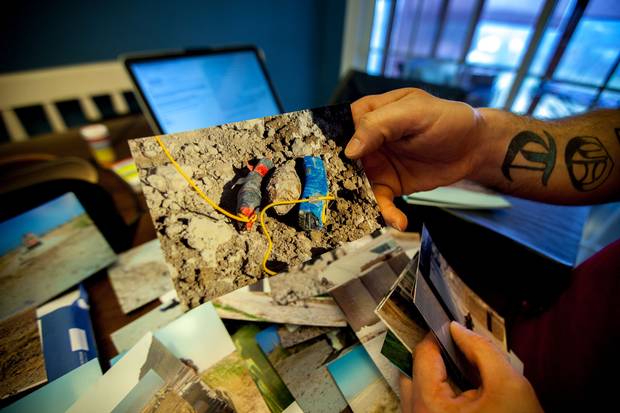
Mike McNeil holds a photo of an IED found during his tour in Afghanistan.
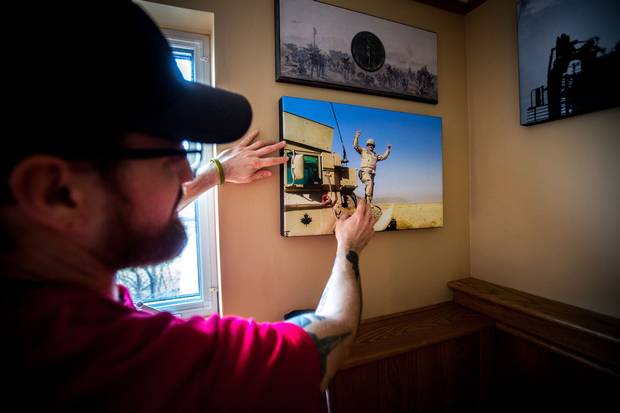
Mr. McNeil displays a photo in his basement from the day he hit the IED in Afghanistan that caused his brain injury. ‘I don’t even remember the photo being taken,’ he says. ‘My buddy just said “smile, you’re alive” and snapped this picture when I finally got out of the vehicle.’
It took nearly 12 hours to get him to the Role 1 hospital at the Kandahar Air Field, where he was treated by an Australian doctor who wrote in his notes that Mr. McNeil needed to undergo a " neuropsych evaluation."
"I thought I was going home to Ottawa to some concussion clinic, that's what I was told," Mr. McNeil said.
Instead, he was turned over to Canadian doctors who declared him fit for duty. He was sent off to do light work at a storage facility for a few days. It took an hour for his dizzy body to get there from his sleeping tent.
Within two weeks, he was back driving the Husky mine-detection vehicle, a tall-standing truck that Mr. McNeil likens to "literally driving your own coffin" because it is so narrow and because of the job it was built to do.
"I was taking Toradol, I was taking Tylenols, I was taking Ibuprofen, I was taking Advil, and I was still reporting pain," he said. "I was high the whole tour."
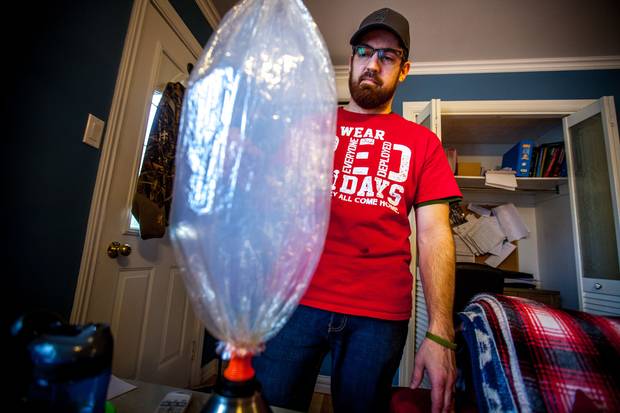
Mr. McNeil uses a vaporizer to ingest medical cannabis to deal with his disabilities.
In Canada, someone who receives a hard knock to the head, followed by unconsciousness, vomiting, dizziness and speech disruptions would normally be given a number of tests for balance, movement, speaking ability, cognition, memory and attention, said Reza Farivar-Mohseni, scientific director of the McGill Health Centre Traumatic Brain Injury Research Unit and Program. "From there, they can be targeted for specific therapies."
In Mr. McNeil's case, there was no treatment except for the painkillers.
A military doctor who examined him in March, 2010, wrote in his notes that Mr. McNeil had been diagnosed with a "traumatic brain injury."
That was confirmed in Canada in November, 2010, after three days of neurological testing, and by another doctor who examined him in 2013 and who wrote in her assessment: "I do not expect further medical improvement in his traumatic brain injury as he is over three years post-injury."
The $70,000 that he would get from the critical injury benefit could be used to supplement the family income while his wife goes back to school, Mr. McNeil said.
But, after losing multiple appeals to receive a benefit to which he believes he is entitled, he said it is not about the money any more. "They picked a fight with a veteran that will never back down from them."
MORE FROM THE GLOBE AND MAIL
Afghanistan veteran finds solace from PTSD in nature
